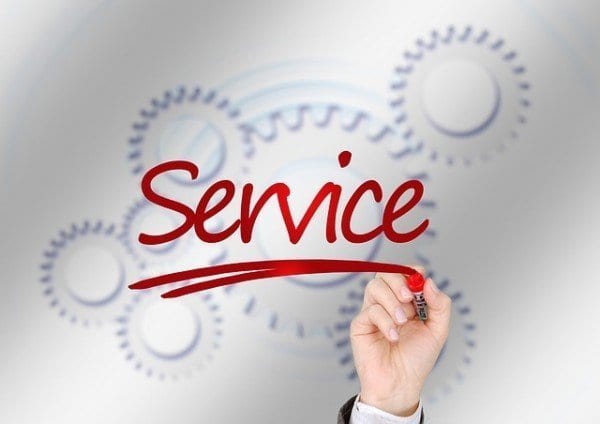A customer service call script is easily the most essential tool for a customer service agent. The importance of excellent Customer Service to an organisation cannot be overemphasized. Sometimes, a company is as successful as its Customer service team. The Customer Service Team must be proficient enough to be able to keep customers loyal to an organisation.
In a survey by NIC Systems, about 90% of respondents preferred to speak to a customer service agent over the phone rather than walk into the company to fix the situation. That is a whopping 9 persons out of every 10. This means more organisations should be hiring live agents to handle their customer service section, but not only that, these employees must be well trained on how to speak to various calibres of clients over the phone. Why? Simply because a telephone conversation cannot be rehearsed, different customers will likely have various reasons for calling.
In this post, we have put together essential ingredients for a call script that any customer service agent must know to excel in his or her role while on a call with a client, and here they are:

Essential Ingredients for a Customer Service Script Call
-
Follow previous call records
Have you ever heard the “please note that your call may be recorded for training and quality assurance purposes” when you call the customer service line of an organisation? If yes, this is what it is used for. The company records telephone conversations to keep a tab on employee performance and use the recorded call as training material for recruits as they require a proper understanding of how to handle calls with customers with those needs.
What’s more, some clients may be rude and overbearing and every customer service personnel must know how to calm such customers and equally provide the necessary solution to the problem at hand. In general, recorded calls are used to produce better call scripts as the supervisor may pick on few recorded calls to listen from time to time and admonish the agent that handled the call.
Furthermore, recorded calls help organisations to produce conversational call scripts rather than memorised or rehearsed ones.
-
Encourage Positive responses
When writing a call script, you can start with basic details such as name, date of birth, last transaction etc. Doing this helps an aggrieved customer relax for few minutes before bursting out whatever may be agitating him/her, moreover when people are allowed to affirm statements, it gives them a positive outlook.
Hence, when a customer calls and you got all their details right, you would have succeeded in allowing some time for a ‘cool off’, enabling you to carry out your task more calmly and professionally, instead of repeatedly saying ‘we apologise for every inconvenience caused’.

-
Be straightforward and concise
When a customer calls to resolve an issue, the best way to answer is to be straightforward and concise while being polite. When a call script is too long, it wears a customer out, since you are not a friend or business partner with whom the client intends to have a chit-chat. Moreso, a complex call may result in the client continuously saying, ‘sorry I don’t get you’, and before you know it, the call is cut off. To keep your scripts short and straightforward, revise it from time to time to ensure that only relevant issues are included and that it is as clear as possible.
-
Let your call Script be customer-centric
Your scripts should be designed in such a way that there is enough space for the client to respond so that it is not a monologue where only the customer service agent speaks. when this is applied, you find out that your clients respond and are then willing to listen to you after they must have spoken. On the other hand, if the customer service agent continues to speak for so long without the customer being allowed to air his mind as soon as the call is picked, it will create more and more unhappy clients.
When customers call, they are also anxious to speak first that they often miss the basic greeting, hence, it is most important to allow customers to speak and explain what the issue is, while the customer service personnel reiterates his understanding of what was just explained.
Your Script should accommodate a way for service agents to repeat to the customer what the issue is, to ensure that the customer’s issue was gotten correctly so that the right solution is not proffered to the wrong issue.
-
Be flexible
As earlier said, no matter the amount of training given via recorded calls, there will always be something a customer service agent needs to improve upon. In this regard, always review your script and make changes as appropriate. Use new requests and concerns received to update your call script.
Your call script should be very flexible, one that is adaptable and not so rigid. It shouldn’t be distorted just because a line was added. To this end, each agent must be able to handle ‘out of the blue’ questions and answers, which will be based largely on his or her knowledge of the company’s products and policies, among others.
-
Call scripts must be solution-orientated
Apologies are good but not usually enough to placate an aggrieved customer. Rather, include in your call script, phrases such as ‘I will get on that right away and give you a callback or an email once it’s fixed. Customers want to know that you are working on fixing their issue immediately.
When your script is designed this way, a call that may have started on a negative note will end up positively. A further step to take is to empower the agent to solve the issue on their own, in the instance that there was no need for a call, however, when doing this, it must be done reasonably.
For better understanding, here’s an example Hello there, thank you for calling (name of company). My name is (name of agent). I’d like to let you know that this call may be recorded for quality assurance and training purposes. How may I be of help to you today? ……………..Customer speaks…………… As soon as the issue is resolved, the agent will ask if there is any other thing the customer would like to be assisted with, if nothing, say thank you for calling and close the call politely. For example, Is there anything else that I can help you with? Wait for response We hope that you are satisfied with our service, it was nice speaking with you and we look forward to working with you in futureHave a wonderful day ahead.
Summary
When call scripting is done correctly, it’s often a fantastic tool for clear and consistent communication between Customer Service personnel and a customer. For inbound and outbound calls, a great call script can add the expected touch of professionalism to your somewhat boring daily service calls.






